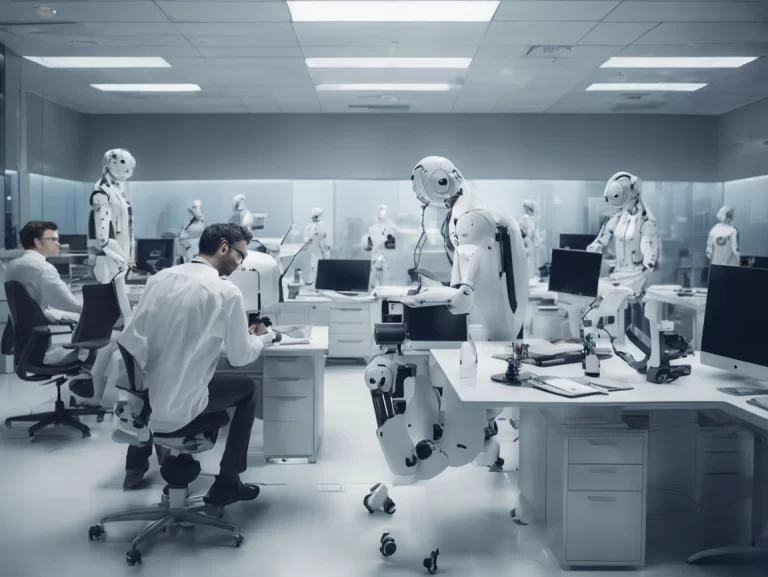Employment Opportunities in AI
MMLI Communications Manager
Communications Manager – National Institute for Biofoundry Applications – IGB
Apply by 6:00 pm CT January 5, 2026 for Communications Manager – National Institute for Biofoundry Applications – Carl R. Woese Institute for Genomic Biology (IGB).
Join the IGB team, an interdisciplinary research institute at the University of Illinois Urbana-Champaign, built on a team-science approach!
The National Institute for BioFoundry Applications (NIBA) integrates synthetic biology, AI, and automation across three NSF-funded centers: the NSF Molecule Maker Lab Institute (MMLI) (moleculemaker.org), Illinois Biofoundry (iBiofoundry) (ibiofoundry.illinois.edu), and Global Center for Biofoundry Applications (gcba.illinois.edu).
Job Summary
Seeking a strategic, proactive communicator to own our story, amplify partnerships, and position NIBA as the go-to institute for AI-driven molecular and biological innovation:
- Draft and implement the strategic communication plans
- Craft compelling narratives
- Manage digital channels
- Translate complex science into content that broadens education, outreach, and workforce development, drives industry engagement, and elevates our scientific impact in academia and beyond
Get details, including Duties & Responsibilities, Minimum Qualifications, and the application. Apply by January 5, 2026.
About IGB
Mission: Advance life sciences research, engage the public in understanding the impact of genomic discoveries, and foster bioeconomic development across Illinois.
IGB researchers lead groundbreaking genomic studies that tackle critical societal challenges in food security, energy, health, technology, and environmental sustainability. The institute’s administrative infrastructure is designed to support dynamic research themes, enabling them to evolve with emerging discoveries, innovative methods, and changing needs.
CosmicAI Fellow — NRAO
The National Science Foundation (NSF)-Simons AI Institute for Cosmic Origins (CosmicAI) is seeking a postdoctoral fellow to help initiate a new comprehensive research program to foster foundational advancements in AI through the analysis and processing of astronomical data at the National Radio Astronomy Observatory (NRAO), located on the grounds of the University of Virginia (UVA) in Charlottesville, Virginia. Other NRAO duty stations may be considered if justified.
This work will be carried out in close collaboration with CosmicAI team members at the University of Utah.
The CosmicAI Fellowship appointment will be awarded initially for a two-year period with an expectation of a third year.
The NRAO is a research and development organization that plays a vital role in the study of the universe. The Observatory operates a variety of radio telescopes that span the globe, including the Very Large Array (VLA) in New Mexico, the Very Long Baseline Array (VLBA) across North America, and the Atacama Large Millimeter/submillimeter Array (ALMA) in Chile. These telescopes are among the most advanced in the world, allowing astronomers to explore the universe in unprecedented detail.
Data volumes for interferometric facilities will increase by over two orders of magnitude in the coming decade with instruments such as the Wideband Sensitivity Upgrade (WSU) on Atacama Large Millimeter/submillimeter Array (ALMA), and the next generation Very Large Array (ngVLA). CosmicAI research efforts at the NRAO will be focused on expediting the calibration, imaging, and analysis of this high-dimensional data. Although stationed at the NRAO, the CosmicAI fellow will have full access to Institute facilities and equipment (e.g., world-class computational resources at TACC, including Vista, a newly instantiated 600 GPU node cluster) and routinely collaborate with Institute members across all sites to facilitate the development of cutting-edge AI tools and methodologies.
Institute directed research will focus on two main areas:
Anomaly Detection for Data Calibration
- Developing a methodology and toolset to distinguish good calibrations from problematic calibrations that currently require human evaluation to expedite high-volume, high-throughput calibration and imaging.
Hyperspectral Cube Image Segmentation:
- Developing robust, automated data segmentation for spatio-kinematic regions of interest in hyperspectral image cubes and leveraging to improve the efficiency of creating compact science-ready data products in imaging pipelines.
Requirements
- PhD in Astronomy, Astrophysics, Physics, Data Science, or a related field.
- Previous experience in data science, data reduction and analysis, radio astronomy, and/or software development.
- Established record of independent research.
- Research expertise in interferometric radio/millimeter/submillimeter astronomy.
- Proficiency working with a geographically distributed, multi-disciplinary team.
TRAILS Postdoctoral Associates (2)
The NSF Institute for Trustworthy AI in Law and Society (TRAILS), based at The George Washington University in Washington, DC, is seeking talented, highly motivated applicants for postdoctoral fellowship positions to conduct research and scholarship focused on approaches to AI that advance trust and trustworthiness.
These are one- or two-year fellowships, with flexible start dates.
- Learn more about/apply for the two-year, on campus (in person) role.
- Learn more about/apply for the one-year, hybrid role.
As a TRAILS Postdoctoral Associate, you will have the opportunity to pursue your own research agenda, interact with the Institute’s diverse array of researchers, and contribute to ongoing research projects. These positions offer an opportunity to work closely with faculty and graduate students in TRAILS, a unique interdisciplinary research community that brings together researchers across AI, incorporating insights from algorithm development, systems engineering and architecture, human psychology, sociology, law, science and technology studies, economics, and policy studies.
Candidates in any area of research related to developing AI techniques, tools, scientific theories, as well as design and policy recommendations that are intended to promote the trustworthiness of AI systems can apply.
TRAILS Postdocs will be mentored by at least two TRAILS faculty members, and applicants whose research interests bridge multiple faculty across different disciplines or institutions will be given preference. Applicants must fulfill their Ph.D. degree requirements, possibly excluding the final submission of their dissertation, prior to joining TRAILS.
About TRAILS
TRAILS aims to transform the practice of AI from one driven primarily by technological innovation to one driven with attention to ethics, human rights, and support for communities whose voices have been marginalized in mainstream AI. TRAILS is a joint research, education, and outreach institute led by the University of Maryland, the George Washington University, Morgan State University, and Cornell University.
- Learn more about/apply for the two-year, on campus (in person) role.
- Learn more about/apply for the one-year, hybrid role.
CosmicAI Postdoctoral Fellow — LLMs/Generative AI
Apply by May 1, 2025 for full consideration. Applicants will be reviewed on an ongoing basis until the position is filled.
The NSF-Simons AI Institute for Cosmic Origins (CosmicAI) seeks highly qualified candidates (within three years of the award of their PhD) for a postdoctoral position with the Explorable Universe research group.
This postdoctoral fellow position will perform research with the Explorable Universe team on developing next-generation generative AI copilots and agents to aid astronomy research, inclusive of text and/or multimodal foundational models. Successful candidates will be appointed within the Department of Computer Science at the University of Texas, Austin (UT Austin) and co-supervised by the team of Greg Durrett, Jessy Li, and Matthew Lease.
- Write and review manuscripts for publication in peer-reviewed conferences and journals, with a focus on NLP/ML/HCI-related venues (e.g., *CL, COLM, EMNLP, ICLR, NeurIPS, CHI, CSCW, IUI, UIST, etc).
- Present research findings, both internally and in public forums.
- Engage in collaborative research within UT Austin and across CosmicAI-affiliated universities and labs.
- Mentor students in research.
- Contribute to grant writing efforts.
- Organize seminars, workshops, and other research-related activities.
- Advance collaborative projects with CosmicAI’s partner organizations, such as the Allen Institute for Artificial Intelligence (Ai2).
Appointments will begin in Fall 2025, with a term of 1 year and the possibility of renewal based upon performance.
Learn more about the role. Applicants will be reviewed on an ongoing basis until the position is filled.
About CosmicAI
Funded by the National Science Foundation and the Simons Foundation, the NSF-Simons AI Institute for Cosmic Origins (CosmicAI) aims to grow transformative AI advances, reform research workflows, and increase astronomy and AI accessibility through developments in four fundamental AI pillars: trustworthiness, robustness, explainability, and efficiency.
The CosmicAI Institute unites researchers from the University of Texas at Austin, University of Virginia, University of Utah, National Radio Astronomy Observatory (NRAO), National Optical and Infrared Research Laboratory (NOIRLab), University of California Los Angeles, and the SLAC National Accelerator Laboratory.
Apply by May 1, 2025 for full consideration.




